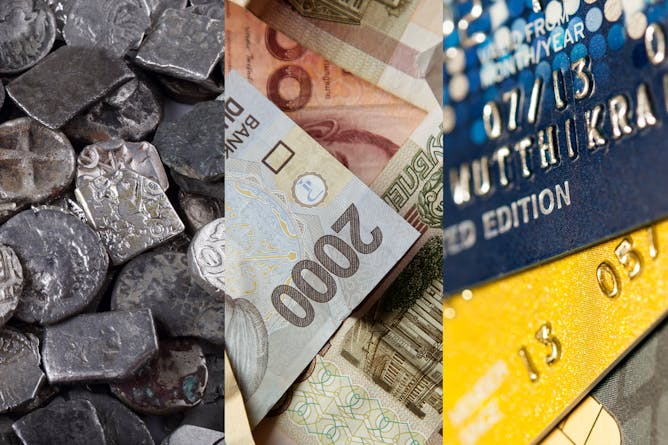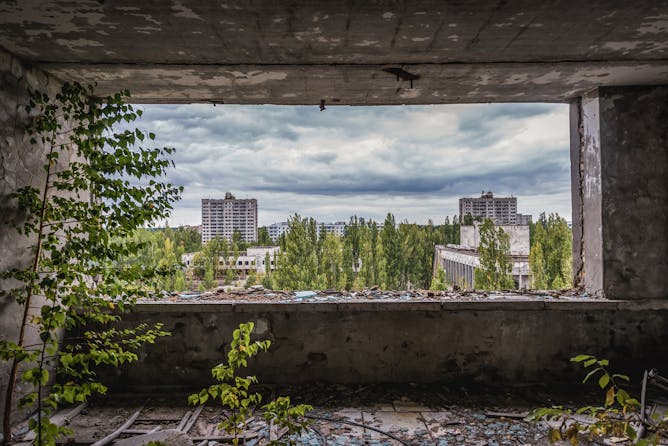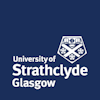|
|
|
Editor's note
|
|
There are a number of longstanding myths about money, and you probably believe some of them. It is commonly thought, for example, that the original money was made from precious metal. That it emerged from a market economy based on barter. That new wealth is still created purely through the market. That there is no magic money tree.
Ring any bells? In the latest in our new Insights long reads, Mary Mellor debunks these and other beliefs about money using lessons gathered from history, anthropology and sociology. Her alternative history of money reveals the fairytale nature of conventional economics – and particularly neoliberalism – which fundamentally misrepresent where money comes from. Her radical new perspective also offers hope:
money originally served a social purpose, she writes, and can be redesigned to do so again.
More than 30 years after the Chernobyl disaster in Soviet Ukraine, we’re still discovering more about the impact of the fallout. But rarely have the details been pored over in such dramatic fashion as in the acclaimed HBO/Sky television series, Chernobyl. The drama is gripping, but Jim Smith, who has made many trips to the exclusion zone, offers ten examples of where the facts don’t match the fiction. In another dispatch from Chernobyl, Stuart Thompson explains why plants are more resilient to radioactivity than animals, despite the fact they can’t uproot and move away from the problem.
If you’re not sure what’s “peng” and what’s “dutty”, modern slang can sound fantastically outlandish. But it’s used by young people across the country – including those involved in gangs and violent crime. Rather than treating slang with suspicion, authorities would be better off sitting down with an Urban British English dictionary – or they risk alienating a whole generation, who want to be free to express their feelings, motivations and concerns in their own language.
|
Josephine Lethbridge
Interdisciplinary Editor
|

|
|
Top story
|

Alex Coan/MD_Photography/Ti_ser, Shutterstock.com
Mary Mellor, Northumbria University, Newcastle
Far from being a technical, commercial instrument, money can be a social and political construct that has immense radical potential.
|

An abandoned hotel building in Pripyat, a few miles from Chernobyl.
Fotokon/Shutterstock
Stuart Thompson, University of Westminster
Most plant life survived the nuclear disaster at Chernobyl - and they have a lack of legs to thank for it.
|

Slang: sometimes difficult to decipher.
Thomas Hawk/Flickr.
Tony Thorne, King's College London
The relationship between street slang used by young people and secret codes deployed by gang members is not always straightforward.
|
Science + Technology
|
-
Tara Van Ho, University of Essex
Who has the right to use an Amazon domain name? The people who live there or a company with the same name?
-
Jim Smith, University of Portsmouth
Documentary or drama? The HBO/Sky series is gripping watching, but sometimes facts make way for artistic licence.
-
Patricia Shaw, Aberystwyth University
Teaching robots to care for us in old age will be child's play.
|
|
Politics + Society
|
-
Riccardo Labianco, SOAS, University of London
The UK Court of Appeal ruled that the British government did not properly assess whether Saudi Arabia had violated international law. What this means for the arms trade.
-
Paul Whiteley, University of Essex; Harold D Clarke, University of Texas at Dallas
Accusations of skullduggery abound, and these findings won't help matters.
|
|
Environment + Energy
|
-
Rebecca Willis, Lancaster University
A citizens' assembly can help identify what the people want. Because if climate action is not democratic, it’s not realistic.
-
Heather Alberro, Nottingham Trent University
Our relationship with the natural world is humanity's defining challenge. Inspired by ecotopian novels, communities and movements across the world are working to meet it.
|
|
Arts + Culture
|
-
Anna Sergi, University of Essex
High-profile cases of corruption, ticket touting and match fixing have led Italians to lose faith in the beautiful game.
|
|
Business + Economy
|
-
Phil Tomlinson, University of Bath; Amy Glasmeier, Massachusetts Institute of Technology; David Bailey, University of Birmingham; Peter Tyler, University of Cambridge
Properly executed, government intervention can provide a real economic boost.
|
|
Education
|
-
Ian Collen, Queen's University Belfast
Northern Ireland is the only part of the UK where primary school pupils do not have to learn another language.
|
|
Health + Medicine
|
-
Federica Boiocchi, Aston University
Don't let that fly land in your hospital room. It could be carrying dangerous strains of bacteria.
|
|
| |
Featured events
|

|
Open University, Milton Keynes, Buckinghamshire, MK7 6AA, United Kingdom of Great Britain and Northern Ireland — The Open University
|

|
King Henry Building, King Henry I Street, Portsmouth, Hampshire, PO1 2DY, United Kingdom of Great Britain and Northern Ireland — University of Portsmouth
|

|
Huntingdon Room, King's Manor, York, York, YO1 7EP, United Kingdom of Great Britain and Northern Ireland — University of York
|

|
99 George St , Glasgow, Glasgow City, G11RD, United Kingdom of Great Britain and Northern Ireland — University of Strathclyde
|
|
|
|
| |
| |
| |
| |
| |
|
|
|
|
|
|
|